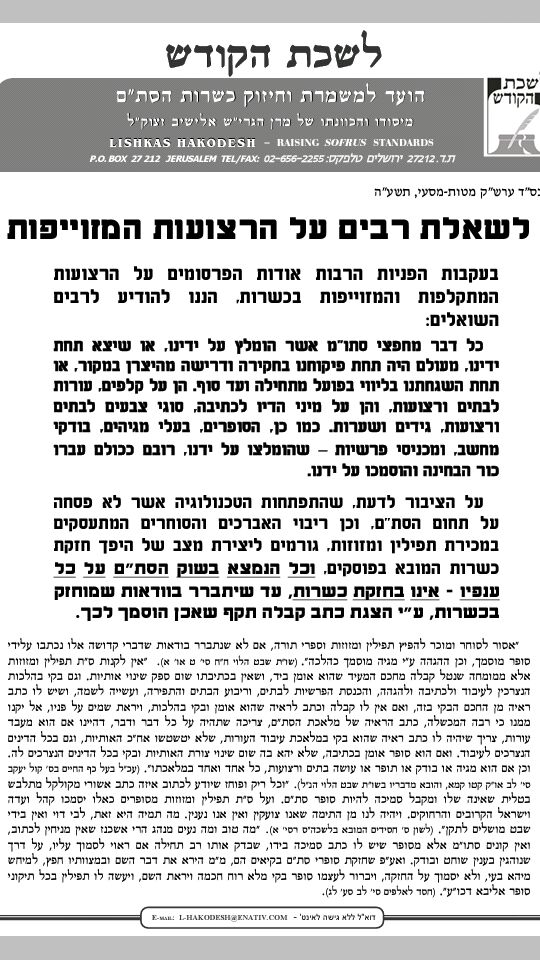If You Bought Tefillin in the Last Two Years, This Article Should Concern You
The phenomenon of fake tefillin straps is on the rise. Using a logo reminiscent of a kosher manufacturer, counterfeit producers are mixing plastic with leather and selling invalid tefillin at full price. What can be done? "If we manage to prompt even one Jew to ask the right questions before buying tefillin, this will be our reward," says an expert.

For many months, rabbis in the field of sacred writing have been warning about the growing issue of counterfeit tefillin straps, a notorious phenomenon that is gaining momentum. There are concerns that a large factory is producing and even distributing straps with severe halachic (Jewish legal) issues. Emanuel Friedman, a scribe from Kiryat Shmona (37), who recently fell victim to counterfeit straps likely purchased from the same dubious manufacturer, explains: "One of the main issues is the type of leather used by manufacturers. Genuine upper leather, which most certified producers use, is considered the superior and celebrated part, while the lower leather, called split, is of lower quality."
The cost differences between the two types of leather are significant: a set of straps made of split leather costs about 35 NIS, whereas a similar set made of premium leather costs between 150 and 180 NIS. According to Friedman, the price differences are justified, as the outer leather is stronger and more durable over time. In contrast, the internal and fleshy leather tends to wear out and tear more quickly, rendering the tefillin invalid.
So how does the Jewish mind overcome wear and tear? Very simply: by using two layers of leather and synthetic plastic mixed with rubber. The top part is plastic, and the bottom part is leather. Such a mix is universally prohibited, but that's not the end: "The absurdity is that a person who buys such tefillin pays for type A and gets type D."
"The market is flooded with counterfeits, and anyone intending to buy tefillin must be very careful and keep a close eye not to fall into the trap, as I did," he says. When asked how a professional with a keen eye can fall into such a trap, Friedman explains that this is precisely the issue, the 'deception within the deception.' "The factory is very sophisticated and knows how to 'play' with people's perceptions. It took the name of another well-certified manufacturer and simply crafted a logo similar to that producer’s logo. The finished product looks remarkably accurate, making it very difficult to differentiate between real and fake."
Only after a friend pointed out to him that the strap's logo (which he also sold) did not match the kosher manufacturer's logo did Friedman realize the significant error.
So what did you do?
"Since I had already sold several sets of such counterfeit straps, I tried to contact everyone I could to inform them about it, but usually, after the fact, there isn't much you can do. The wisdom is to approach a certified source and ask the right questions. I recommend a God-fearing rabbi who is also an authority in the field. One who can tell you where the straps come from and whether they are kosher or not. The more recognized certifications are from the Badatz and Rabbi Landa, among others." After the incident, Friedman went to a God-fearing manufacturer with a personal supervisor and purchased replacement straps.
During our conversation, Friedman told me about an event that occurred just yesterday before his eyes. "I entered a synagogue and saw an elderly person struggling with his tefillin for a long time. When I asked what he was doing, he said that the strap of his tefillin split in two, and he was trying to fix it. Selling tefillin with such straps to an elderly person is sheer fraud, and those responsible should be held accountable. If someone can commit such a deception, who is to say he processed the strap properly, as a mitzvah? Such a fraudster is like a mohel going around with a contaminated knife performing circumcisions on every child he encounters."
If the issues are as serious as you describe, why hasn't an organization stepped up to address these frauds and put an end to them?
(Smiling ironically) "In my opinion, this is something that will never happen, as there is too much 'black' money involved in this market. However, if we can get even one more Jew to wake up and ask the right questions before buying his tefillin, we will have made a pure profit, and this will be our reward."
Watch the video showing the invalid straps:
Here are some posters published on the matter:




